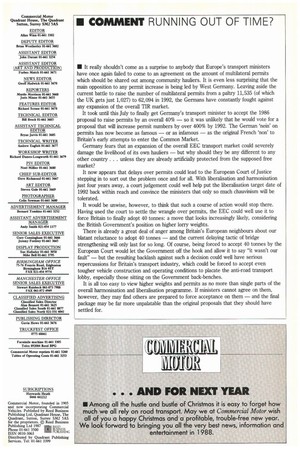• It really shouldn't come as a surprise to anybody
Page 5

If you've noticed an error in this article please click here to report it so we can fix it.
that Europe's transport ministers have once again failed to come to an agreement on the amount of multilateral permits which should be shared out among community hauliers. It is even less surprising that the main opposition to any permit increase is being led by West Germany. Leaving aside the current battle to raise the number of multilateral permits from a paltry 11,535 (of which the UK gets just 1,027) to 62,094 in 1992, the Germans have constantly fought against any expansion of the overall TIR market.
It took until this July to finally get Germany's transport minister to accept the 1986 proposal to raise permits by an overall 40% — so it was unlikely that he would vote for a proposal that will increase permit numbers by over 400% by 1992. The German 'nein' on permits has now become as famous — or as infamous — as the original French 'non' to Britain's early attempts to enter the Common Market.
Germany fears that an expansion of the overall EEC transport market could severely damage the livelihood of its own hauliers — but why should they be any different to any other country unless they are already artificially protected from the supposed free market?
It now appears that delays over permits could lead to the European Court of Justice stepping in to sort out the problem once and for all. With liberalisation and harmonisation just four years away, a court judgement could well help put the liberalisation target date of 1992 back within reach and convince the ministers that only so much chauvinism will be tolerated.
It would be unwise, however, to think that such a course of action would stop there. Having used the court to settle the wrangle over permits, the EEC could well use it to force Britain to finally adopt 40 tonnes: a move that looks increasingly likely, considering the British Government's position on higher lorry weights.
There is already a great deal of anger among Britain's European neighbours about our blatant reluctance to adopt 40 tonnes — and the current delaying tactic of bridge strengthening will only last for so long. Of course, being forced to accept 40 tonnes by the European Court would let the Government off the hook and allow it to say "it wasn't our fault" — but the resulting backlash against such a decision could well have serious repercussions for Britain's transport industry, which could be forced to accept even tougher vehicle construction and operating conditions to placate the anti-road transport lobby, especially those sitting on the Government back-benches.
It is all too easy to view higher weights and permits as no more than single parts of the overall harmonisation and liberalisation programme. If ministers cannot agree on them, however, they may find others are prepared to force acceptance on them — and the final package may be far more unpalatable than the original proposals that they should have settled for.








































































































